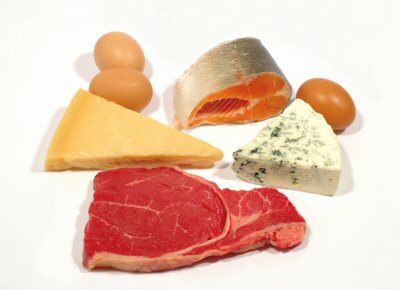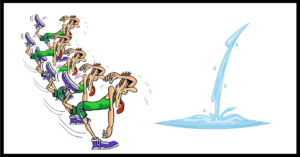

That depends really on what you call a high protein diet. The study looked at 10% of calories coming from protein, vs 15% and 25%. The findings DO NOT support those who advocate excessive amounts of protein in the diet. (Some eating plans strive for over 40% of calories coming from protein).
The researchers from Sydney Uni have shown that people on a 10 percent protein diet will eat more snacks between meals and consume significantly more calories in total compared with people on a 15 percent protein diet. The results show that dietary protein plays an important role in appetite and total food consumption in humans. “Humans have a particularly strong appetite for protein, and when the proportion of protein in the diet is low this appetite can drive excess energy intake,” said lead author Dr Alison Gosby. The ‘protein-leverage’ hypothesis, proposes that animals have a fixed protein target, which they will defend at the expense of other nutrients.
In their new study Dr Alison Gosby and Professor Steve Simpson wanted to test the ‘protein-leverage’ effect in humans. The researchers created three menus that represented low (10 percent), intermediate (15 percent) and high (25 percent) protein, based on data from the World Health Organization recommending people eat 15 percent protein diets. With the exception of protein, the three diets were identical in all other factors such as appearance, palatability, variety and availability. The researchers then took a group of 22 lean people and fed each subject each of the three menus during three separate four-day periods, monitoring energy intake over each four-day period and hunger ratings on day four. They found subjects who ate a 10 percent protein diet consumed 12 percent more energy over four days than those eating a 15 percent protein diet. Moreover, 70 percent of the increased energy intake on the lower protein diet was attributed to snacking.
When the protein content was further increased to 25 percent, however, the researchers observed no change in behavior relative to the 15 percent protein diet. On the fourth day of the trial, however, there was a greater increase in the hunger score between 1–2 hours after the 10 per cent protein breakfast versus the 25 percent protein breakfast.
Dr Gosby commented: “This result confirms the ‘protein-leverage’ effect in humans and importantly, shows counting calories is not enough to manage appetite and body weight. In the western world, where food is abundant, if you reduce your calorie intake but fail to reach your protein target you will find it hard to resist hunger pangs.”
Take a close look at this statement from Dr Gosby. She is not saying you can eat the same amount of calories, but as long as you eat protein you will lose weight, she is saying you need to reduce your calories, and taking in enough protein will help you do that. Weight loss is still about taking in less energy than you expend.
Dr Gosby points out their “results indicate low protein diets will cause humans to overeat. Tragically in the modern westernised environment there are many factors encouraging us to eat foods that are high in sugars and fat, including reduced cost and increased availability of these foods. Underpinning all this is our ancestral environment in which fat and simple sugars were highly prized, leaving us with a predilection for these foods.”
Does this mean that you should load up on protein?
Whilst protein has it’s place in your diet, too much protein can have detrimental effects on your health. Diets in which protein makes up a large amount of your daily caloric intake, so-called ketogenic diets, cause a build up of toxic ketones in your body. Your kidneys are pushed into overdrive in order to flush the ketones from your body, and you can lose significant amounts of water, putting you at risk of dehydration. This of course is exacerbated if you exercise heavily, particularly in the summer months.
As well as fluid loss, high protein diets can cause calcium to be leached from your bones. Ketongenic diets can cause blood acidity. The correct pH balance of your blood is imperative if your blood is to deliver vital nutrients around your body. Your body recognises the pH imbalance in your blood and does something about it. The acidity needs to be counteracted by a buffer to return the blood to it’s correct pH. One such buffer is calcium, which is found in your bones and teeth. Basically, your body considers that your blood needs the calcium (to counteract acidity) more than your bones and teeth do, and you can become calcium deficient and suffer form oesteoporosis if you maintain a hight protein diet for a prolonged period.
Not only that, dehydration from a ketogenic diet can give you bad breath!!
What does a 15% protein day look like?
Don’t stress too much about hitting the magic 15% mark. Being too technical can turn you off even trying. You should simply be aiming to have protein at every meal. For meat, chicken and fish, a good rule of thumb is to have a portion about the size of the palm of your hand at meal times. Be sure to trim off all visible fat (except from fish as these are good fats). Skin needs to be trimmed from poultry BEFORE cooking. Try eggs for breakfast rather than sweet (and often salty) cereal. Try nuts and seeds instead of dipping into the biscuit tin. Limit fruit to no more than 2 pieces a day, and ditch the fruit juice for water.
If you are eating a sandwich at lunchtime, two slabs of bread and a skinny bit of ham in the middle doesn’t really cut it. Try a tuna sandwich with avocado instead of butter. Add a boiled egg to your lunchbox. A good amount of protein at lunchtime will go a long way to stopping that mid-afternoon forage to the snack dispenser!
Add your tips for including more protein in the diet below.



